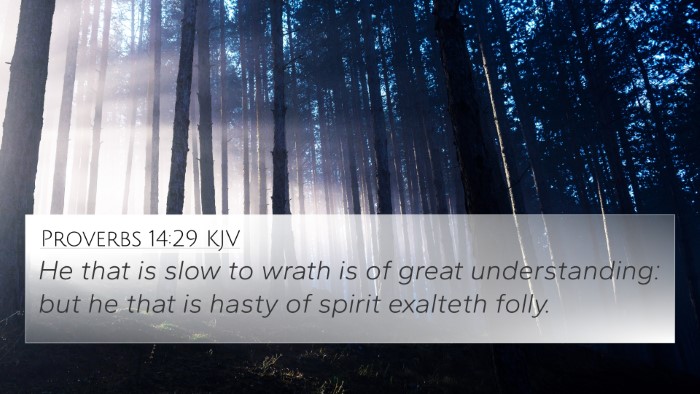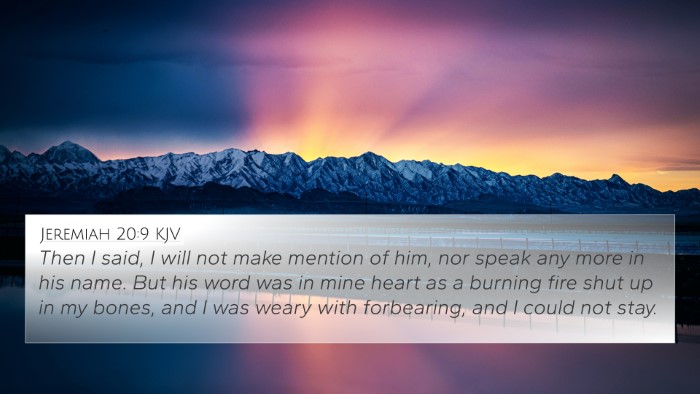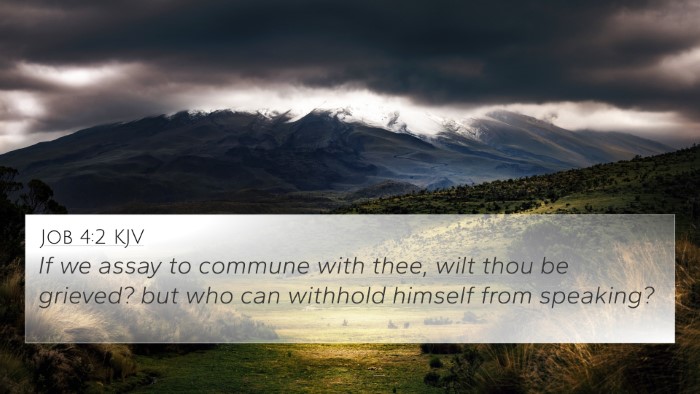Old Testament
Genesis Exodus Leviticus Numbers Deuteronomy Joshua Judges Ruth 1 Samuel 2 Samuel 1 Kings 2 Kings 1 Chronicles 2 Chronicles Ezra Nehemiah Esther Job Psalms Proverbs Ecclesiastes Song of Solomon Isaiah Jeremiah Lamentations Ezekiel Daniel Hosea Joel Amos Obadiah Jonah Micah Nahum Habakkuk Zephaniah Haggai Zechariah MalachiJob 20:2 Similar Verses
Job 20:2 Cross References
Therefore do my thoughts cause me to answer, and for this I make haste.
Uncover the Rich Themes and Topics of This Bible Verse
Listed below are the Bible themes associated with Job 20:2. We invite you to explore each theme to gain deeper insights into the Scriptures.
Job 20:2 Cross Reference Verses
This section features a detailed cross-reference designed to enrich your understanding of the Scriptures. Below, you will find carefully selected verses that echo the themes and teachings related to Job 20:2 KJV. Click on any image to explore detailed analyses of related Bible verses and uncover deeper theological insights.

Proverbs 14:29 (KJV) »
He that is slow to wrath is of great understanding: but he that is hasty of spirit exalteth folly.

Psalms 31:22 (KJV) »
For I said in my haste, I am cut off from before thine eyes: nevertheless thou heardest the voice of my supplications when I cried unto thee.

Romans 10:2 (KJV) »
For I bear them record that they have a zeal of God, but not according to knowledge.

Mark 6:25 (KJV) »
And she came in straightway with haste unto the king, and asked, saying, I will that thou give me by and by in a charger the head of John the Baptist.

Jeremiah 20:9 (KJV) »
Then I said, I will not make mention of him, nor speak any more in his name. But his word was in mine heart as a burning fire shut up in my bones, and I was weary with forbearing, and I could not stay.

Ecclesiastes 7:9 (KJV) »
Be not hasty in thy spirit to be angry: for anger resteth in the bosom of fools.

Proverbs 29:20 (KJV) »
Seest thou a man that is hasty in his words? there is more hope of a fool than of him.

Psalms 39:2 (KJV) »
I was dumb with silence, I held my peace, even from good; and my sorrow was stirred.

Job 13:19 (KJV) »
Who is he that will plead with me? for now, if I hold my tongue, I shall give up the ghost.

Job 4:2 (KJV) »
If we assay to commune with thee, wilt thou be grieved? but who can withhold himself from speaking?

Job 20:3 (KJV) »
I have heard the check of my reproach, and the spirit of my understanding causeth me to answer.

James 1:19 (KJV) »
Wherefore, my beloved brethren, let every man be swift to hear, slow to speak, slow to wrath:
Job 20:2 Verse Analysis and Similar Verses
Meaning and Interpretation of Job 20:2
Job 20:2 states: "Therefore my thoughts cause me to answer, and for this I make haste." This verse comes from the speech of Zophar, one of Job's friends, as he seeks to respond to Job's lamentation regarding his suffering. Below is a summary of insights based on public domain commentaries by Matthew Henry, Albert Barnes, and Adam Clarke, along with related Bible verses for deeper study.
Summary of Insights
Zophar, in this verse, expresses his urgency and necessity to respond to Job's plight. His thoughts are compelling him to speak, indicating the weight of the matters being discussed. This reflects a common theme in biblical discourse, where thoughts and reflections lead to public speaking or prophetic pronouncement. The context reveals that Zophar anticipates that Job's suffering must stem from his wrongdoing, and he is eager to articulate his judgments on this matter.
Key Themes
- The Nature of Suffering: Zophar’s response points to the wider biblical theme of understanding suffering and its possible divine underpinnings.
- Wisdom and Knowledge: The urgency in Zophar’s tone reveals the importance placed on gaining divine wisdom to address existential questions.
- Human Response to God’s Discipline: This highlights humanity's often flawed understanding of God's actions in the world.
Cross-References
Here are connections to other Bible verses that relate to the themes expressed in Job 20:2:
- Job 13:23-24: Job pleads for an examination of his life, suggesting self-awareness that often precedes urgent declarations.
- Psalms 42:3: The internal struggle and the haste of emotional turmoil, reflecting similar urgency in expression.
- Proverbs 29:11: Speaks on a fool's anger, paralleling Zophar's impulsive need to respond.
- Ecclesiastes 3:7: Emphasizes a time to keep silence and a time to speak, linking to Zophar's commentary on the necessity for speech.
- James 1:19: Encourages being swift to hear but slow to speak, which contrasts with Zophar's hasty speech.
- Isaiah 41:21: A call for reasons and judgments before God, which Zophar seems to be doing in haste.
- Psalms 119:11: The internalization of God’s word leading to a compelled response in understanding life’s tribulations.
- Jeremiah 20:9: The prophet expresses a burning urgency to speak for God, reminiscent of Zophar’s situation.
Thematic Connections
The thematic connections within the Bible surrounding Job 20:2 are significant, exploring how human suffering and divine justice are discussed throughout various scriptures. Insights into suffering and the implications of God's character can be brought out through comparative Bible verse analysis, leading to a richer understanding of scriptural truths:
- The Problem of Evil: Examined in a broader context throughout Job and echoed in Galatians 6:7 — "For whatever a man sows, that he will also reap."
- Human Reasoning vs. Divine Wisdom: Explored in Proverbs 3:5-6, “Trust in the Lord with all your heart, and lean not on your own understanding.”
Conclusion
Job 20:2 calls attention to the interplay between human thoughts and speech in the face of suffering. Zophar’s rush to judge reflects a larger biblical dialogue about grappling with the divine reasons behind human pain. Through examining related verses, scholars and laypersons alike can appreciate the complex nature of suffering as depicted in scripture.
As we study Job 20:2, cross-referencing other biblical texts enhances our understanding. Utilizing tools like a Bible concordance or a Bible cross-reference guide can lead to meaningful insights into the connections between Bible verses. Engaging in cross-referencing Bible study can reveal profound themes and evaluations of God's relationship with humanity.
Additional Resources for Study
- Tools for Bible Cross-Referencing: Integrate relevant tools to explore cross-references and connections between scriptures.
- Bible Reference Resources: Utilize comprehensive materials for in-depth study of the scriptures.
- How to Use Bible Cross-References: Learn methods to observe thematic connections and enhance scriptural understanding.




